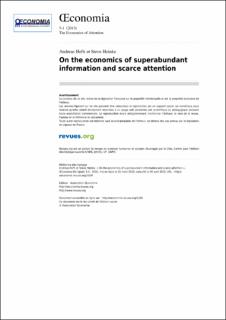Please use this identifier to cite or link to this item:
https://doi.org/10.21256/zhaw-4671Full metadata record
| DC Field | Value | Language |
|---|---|---|
| dc.contributor.author | Hefti, Andreas | - |
| dc.contributor.author | Heinke, Steve | - |
| dc.date.accessioned | 2018-08-17T06:31:50Z | - |
| dc.date.available | 2018-08-17T06:31:50Z | - |
| dc.date.issued | 2015 | - |
| dc.identifier.issn | 2113-5207 | de_CH |
| dc.identifier.issn | 2269-8450 | de_CH |
| dc.identifier.uri | https://digitalcollection.zhaw.ch/handle/11475/9049 | - |
| dc.description.abstract | This article provides an introduction to the literature addressing the causes and consequences of limited attention in economics. We present a simple set-theoretic micro-structure describing the allocation of attention, and use this framework to explain the central notions of goal-and stimulus-driven attention mechanisms. After presenting empirical evidence on limited attention from psychology, marketing and internet research, we use our baseline setting to discuss a number of recent contributions featuring some form of limited attention or related phenomena, such as obfuscation. | de_CH |
| dc.language.iso | en | de_CH |
| dc.publisher | Association Oeconomia | de_CH |
| dc.relation.ispartof | Oeconomia | de_CH |
| dc.rights | https://creativecommons.org/licenses/by-nc-nd/4.0/ | de_CH |
| dc.subject | Limited attention | de_CH |
| dc.subject | Information overload | de_CH |
| dc.subject | Attention allocation | de_CH |
| dc.subject | Salience | de_CH |
| dc.subject | Perception | de_CH |
| dc.subject | Informative advertising | de_CH |
| dc.subject | Rational inattention | de_CH |
| dc.subject | Rounded rationality | de_CH |
| dc.subject.ddc | 330: Wirtschaft | de_CH |
| dc.title | On the economics of superabundant information and scarce attention | de_CH |
| dc.type | Beitrag in wissenschaftlicher Zeitschrift | de_CH |
| dcterms.type | Text | de_CH |
| zhaw.departement | School of Management and Law | de_CH |
| zhaw.organisationalunit | Zentrum für Energie und Umwelt (CEE) | de_CH |
| dc.identifier.doi | 10.21256/zhaw-4671 | - |
| dc.identifier.doi | 10.4000/oeconomia.1104 | de_CH |
| zhaw.funding.eu | No | de_CH |
| zhaw.issue | 1 | de_CH |
| zhaw.originated.zhaw | Yes | de_CH |
| zhaw.pages.end | 76 | de_CH |
| zhaw.pages.start | 37 | de_CH |
| zhaw.publication.status | publishedVersion | de_CH |
| zhaw.volume | 5 | de_CH |
| zhaw.publication.review | Peer review (Publikation) | de_CH |
| Appears in collections: | Publikationen School of Management and Law | |
Files in This Item:
| File | Description | Size | Format | |
|---|---|---|---|---|
| On the economics of superabundant information and scarce attentiion-1.pdf | 484.96 kB | Adobe PDF |  View/Open |
Show simple item record
Hefti, A., & Heinke, S. (2015). On the economics of superabundant information and scarce attention. Oeconomia, 5(1), 37–76. https://doi.org/10.21256/zhaw-4671
Hefti, A. and Heinke, S. (2015) ‘On the economics of superabundant information and scarce attention’, Oeconomia, 5(1), pp. 37–76. Available at: https://doi.org/10.21256/zhaw-4671.
A. Hefti and S. Heinke, “On the economics of superabundant information and scarce attention,” Oeconomia, vol. 5, no. 1, pp. 37–76, 2015, doi: 10.21256/zhaw-4671.
HEFTI, Andreas und Steve HEINKE, 2015. On the economics of superabundant information and scarce attention. Oeconomia. 2015. Bd. 5, Nr. 1, S. 37–76. DOI 10.21256/zhaw-4671
Hefti, Andreas, and Steve Heinke. 2015. “On the Economics of Superabundant Information and Scarce Attention.” Oeconomia 5 (1): 37–76. https://doi.org/10.21256/zhaw-4671.
Hefti, Andreas, and Steve Heinke. “On the Economics of Superabundant Information and Scarce Attention.” Oeconomia, vol. 5, no. 1, 2015, pp. 37–76, https://doi.org/10.21256/zhaw-4671.
Items in DSpace are protected by copyright, with all rights reserved, unless otherwise indicated.